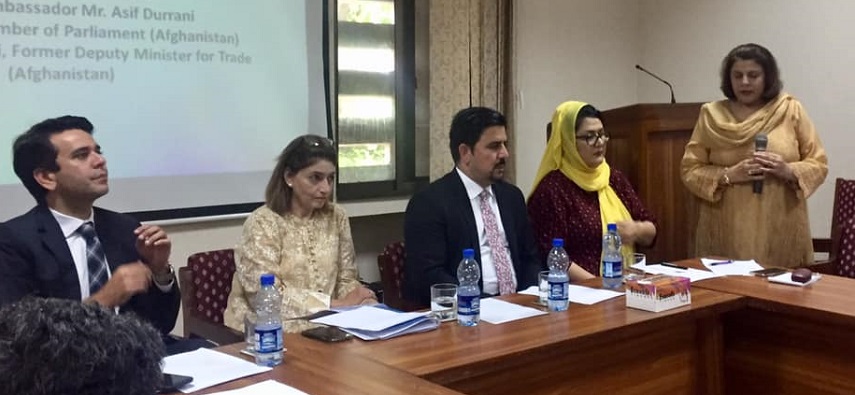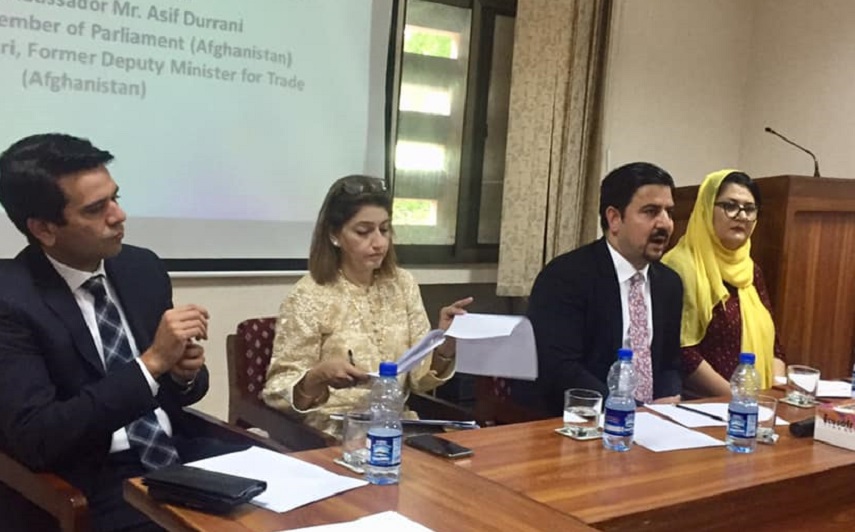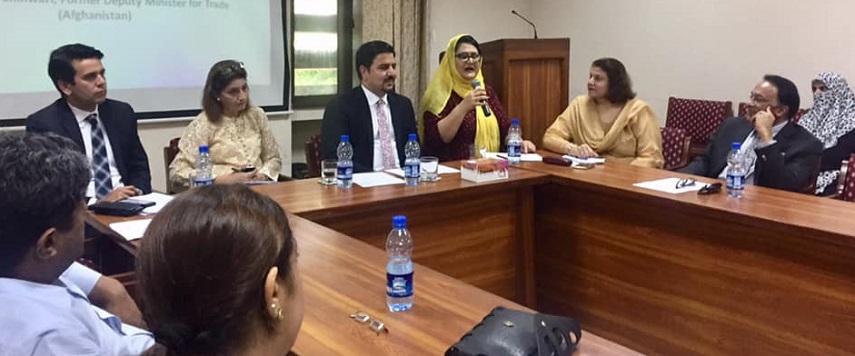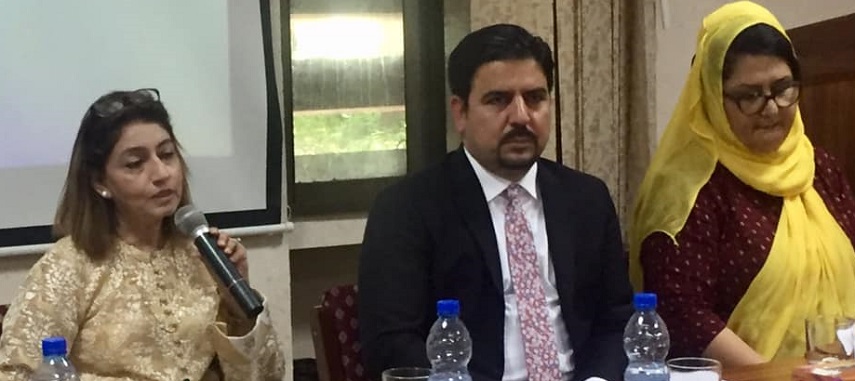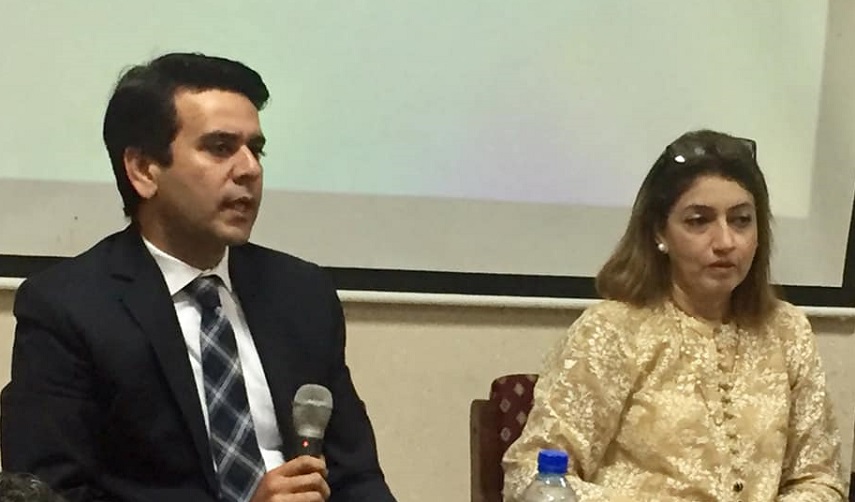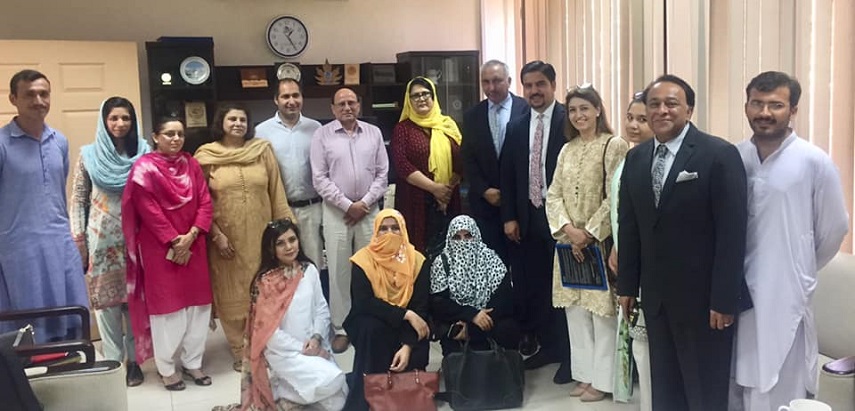Center for Research and Security Studies (CRSS), as part of the outreach program and university interaction, planned for Beyond Boundaries III – the Track 1.5/II project, two distinguished members each from Pakistani and Afghan delegation visited Quiad-i-Azam University (QAU) Defense Strategic Studies Department, Islamabad on Thursday, August 22, 2019. The interaction was focused on Pak-Afghan bilateral relations, specifically on the theme: “Pak-Afghan Detente, Afghan Peace Process and the Way Forward”. At QAU, the Pakistani group comprised Dr. Huma Baqai, Chairperson and Associate Dean IBA, and Member of Foreign Affairs Advisory Council and Rehman Azhar, Senior journalist- Express TV. The Afghan side included Mozammil Shinwari, Honorary Advisor, Former Deputy Minister for Trade/Chief Executive OESP and Elay Ershad, former Member of Afghan parliament. CRSS was represented by Aized Ali, Project Director – Beyond Boundaries and Sitwat Waqar Bokhari, Senior Research Fellow. The faculty members and about 20-25 students attended the presentations by the two sides at the Department of Defense and Strategic Studies (DSS), QAU. Pak-Afghan delegates were hosted by, Dr. Shabana Fayyaz, Assistant Professor at DSS, QAU.
Dr. Shabana welcomed the group and thanked CRSS for arranging such important interactions for the students to discuss about Pak-Afghan relations and understand better the issues with a rational perspective and objectivity. She further pronounced that such a vigorous dialogue would give the students several themes for research.
Mozammil Shinwari, while taking the lead to initiate the discussion said that peace seems to be a reality in near future. United States has been successful in getting the support of international community to seek a closure to the Afghan conflict. Islamabad has played a very positive role in facilitating the Afghan peace process. Afghan government also expects Pakistan to continue playing such a positive role and contribute in bringing peace back to the war-torn country. In all this scenario, Afghan people have some serious reservations about Taliban being back into power. They are of the view that Taliban want nothing but Islamic Emirates of Afghanistan, as they have always envisioned. They fear losing freedom of speech, women rights, free media, women empowerment and human rights. Afghans have a come a long way; they just don’t want to back to Taliban’s rule set-up.
Elay Ershad put forward thought provoking questions to the audience. She said why Afghanistan is burning? Why most of the Muslim countries are in a mess? Why there arises a need for US to mediate between two Muslim countries fighting with each other? Why do Muslims fight with each other? She sentimentally gave the message “unity is strength” and referred to the concept of Muslim Ummah – all Muslims being one family.
Dr. Huma Baqai, representing Pakistani side, stated that Pakistan and Afghanistan had lots of issues and were involved in blame game. Though, in last 2,3 years Kabul and Islamabad managed to have constructive engagements. Both agreed on many things; progress is slow but visible. Regarding Afghan peace process, she said it is a defining moment in the history of Afghanistan. Moreover, she said that Pakistan has a huge responsibility as all parties expect Pakistan to facilitate. It is bit risky for Pakistan, because in case of failure of talks, Islamabad would earn a bad name and all fingers will be pointed towards Pakistan; still it is taking this huge risk, just to ensure regional peace.
Rehman Azhar opined that instead of moving forward, in terms of public narrative, both countries keep going backward. He cautioned that signing of the peace deal between US and Taliban is not the end of it. It will be the beginning of a very complex matrix of events. The real challenge will be after the peace deal, where all Afghans are supposed to sit together and chalk out a road-map for the future of their country.
In Q & A Session, students asked different questions from the panelists. Some of these include: What about the ISIS as an emerging threat in the region? Chinese role in Afghan peace process? Role of Afghan women is the development of their country?
The panelists responded that ISIS is definitely a threat, but in case of peace deal it will have no support. ISIS may suffocate if Taliban do not back them. Still deterring Deash would be a biggest test. To China question, Huma Baqai said that Beijing works by the approach of ‘quiet diplomacy’. It makes very few public statements. This is why it made almost no enemies in Afghanistan. Further, no country has planned to invest in Afghanistan as much as China intends to do. Thus, Beijing has a key role to play in Afghan peace process. The best part is that China is in the good books of the stakeholders within Afghanistan. Commenting on role of women, Mozammil Shinwari shared with the audience that Afghan women are very progressive and they are contributing towards their country equally with the men, working shoulder to shoulder. Two of the television channels in Afghanistan are entirely run by women, so one can gauged the extent of Afghan women’s capability, he added.
The session concluded with thank you note by Dr. Shabana Fayyaz, followed by refreshments and a group photo.

